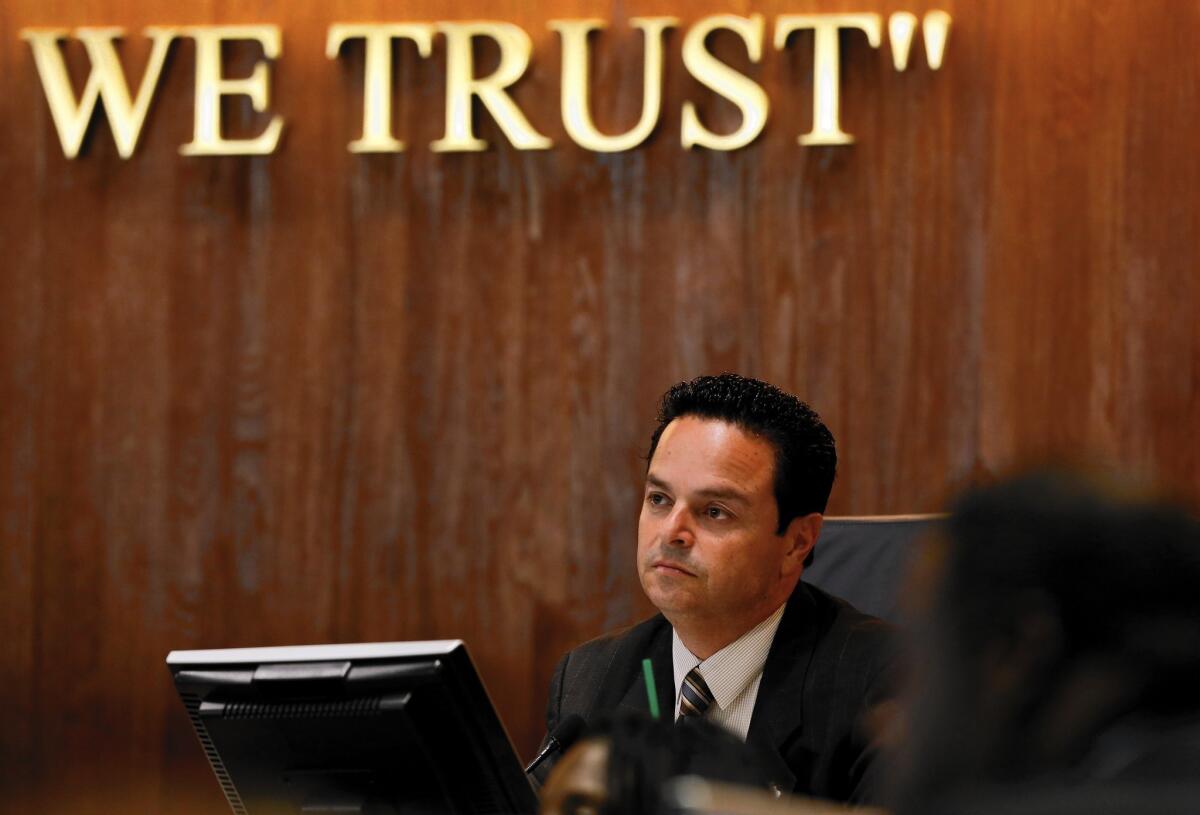Does Carson’s mayor, a leader in the city’s NFL stadium push, live in Carson?

- Share via
A practicing attorney who holds two part-time elected offices, Albert Robles has a daunting work schedule. He’s been even busier since becoming a high-profile promoter of efforts to build an NFL stadium for the San Diego Chargers and Oakland Raiders on an old landfill in Carson, where he is mayor.
Robles said his family comes first, however. Most days begin with breakfast together in a cozy Kenwood Avenue apartment. He drives his two children to school in the morning, he said, sometimes ferries them home in the afternoon and occasionally manages to join them for after-dinner TV.
Several current and former residents of Kenwood described him as a well-liked neighbor of many years. They said they have watched Robles and his wife, Sonjia Quanitte, who owns the apartment building, dote on their son and daughter from the time the children were newborns.
But Robles insisted he has never lived on Kenwood, which is about 10 miles north of Carson in the Adams-Normandie district of Los Angeles. He said he lives with his parents in a small house they own on Carson’s East 214th Street. Robles returns to Kenwood at daybreak, he said.
Much is riding on where Robles lives.
State law generally requires that elected officials live in the communities they represent. If Robles’ primary residence is the apartment building near USC, he would be ineligible to serve as Carson’s mayor at a time he is spearheading the city’s push to bring professional football back to the L.A. area.
In 2013, the most recent year for which figures were available, Robles made more than $100,000 in salary and benefits as mayor and an elected member of a local water board. He said his living arrangement is perfectly proper and that his legal home is Carson, not L.A.
The financial disclosure statements he is required to file as an elected official show Robles received between $10,000 and $100,000 a year in rental income from the four-unit apartment building.
Kenwood residents might mistakenly assume he lives there, Robles said, because they do not understand that he and his wife have an unconventional relationship.
“The notion of a couple, a married couple, only living together as man and wife is not something that holds true today like it did in the 1950s,” the 46-year-old mayor said during an interview in his office at Carson City Hall. “The whole notion of marriage has evolved.”
Carson has been his everyday home, Robles said, since he and Quanitte returned from the Bay Area in 2003 after he completed law school at UC Berkeley and worked as an attorney in San Francisco.
Once back in Southern California, the couple decided to live apart even as they remained in a loving marriage, Robles said. One reason he moved into his parents’ 878-square-foot house, he said, was that “my father is older now and sometimes he can be difficult and can stress my mom out, so I help.”
Robles said he and Quanitte have maintained the arrangement ever since, including after having children.
At various points during the interview, however, Robles alternately described his marriage as being “good” and being in a state of “emotional separation … emotional divorce.”
Robles said he spends most of his free waking hours at the apartment or otherwise with his family. He said he has slept at the apartment fewer than a dozen times in the last three or four years, but “I’m there when they wake up, making them breakfast.”
He said he would provide The Times with telephone records, credit card bills and other documents showing he lives in Carson. After six weeks he failed to do so, despite numerous follow-up requests.
Robles said in an email Friday that he had those records as well as “affidavits” from Carson neighbors declaring that he lives there. He did not immediately produce the material, however.
He also would not allow reporters to visit the Carson house so they could see whether his clothes and other belongings were there. In his email Friday, he said he might arrange such a visit in the future.
According to Robles’ father, Adalberto Robles, the house has been his son’s home “his whole life.”
A man sitting on a porch across 214th Street, who identified himself only as Jim, said Robles indeed lived there. “He’s married, and he moved out for a while and then moved back,” the man said.
Another neighbor, longtime resident Fred Scanlan, said Robles hasn’t lived there since he was a teenager.
“There’s no way he’s living with his parents,” Scanlan said. “He pops in and pops back out. He sees me here and he waves.”
Four current and former residents of Kenwood Avenue said recently that Robles is a fixture in the neighborhood. All requested anonymity because of the personal nature of their relationship with Robles or out of concern that they would alienate him. One man initially said Robles lived on the street, but equivocated when told of the legal ramifications of his residency.
A woman who described herself as a longtime friend of Robles and his wife said the family has lived on Kenwood Avenue for many years. She said there were “on and off” stretches when Robles stayed in Carson to look after his parents, but that the mayor and his wife have never been separated.
“He’s a very good father and a good husband,” she said.
Quanitte did not respond to interview requests.
Legal experts said the question of Robles’ residency could lead to a criminal investigation, if only because of his own account of how much of his life is centered on Adams-Normandie.
“What should the people of Carson think?” said Jessica Levinson, a Loyola law professor and president of the L.A. Ethics Commission. “Well, they should see their mayor dancing way too close to the line on residency.”
In the weeks after the tape-recorded interview, Robles sent The Times a series of emails accusing the newspaper of bias and of invading his privacy.
Robles has drawn authorities’ interest in the past.
In 2004, the L.A. County district attorney’s office first investigated whether he lived in Carson — an inquiry tied to his position on the board of directors for the Water Replenishment District of Southern California, which manages water for almost 4 million people in more than 40 cities in L.A. County.
No charges resulted from that investigation, but the district attorney’s office is trying to remove him from the water board on grounds that there now is a conflict of interest. Prosecutors say the conflict exists because the city of Carson and the water board have overlapping duties, meaning Robles simultaneously serves two masters.
Robles said there is no such conflict, in part because the city has no water department.
NEWSLETTER: Get the day’s top headlines from Times Editor Davan Maharaj >>
In 2008, the district attorney’s office charged Robles with violating election law by allegedly sending out anonymous campaign mailers in a water board race.
Robles, who represented himself, was found not guilty. Incensed by the prosecution, he ran against Dist. Atty. Steve Cooley that year and received 20% of the vote.
The district attorney’s investigations have been “racially motivated,” part of a broader pattern in which the office targets black and Latino officeholders, Robles said.
Robles was elected to the Carson City Council in 2013. In April, his colleagues selected him to be mayor, a job vacated when Jim Dear was elected city clerk.
Dear had been a political ally of Robles until earlier this year. At a June council meeting, Dear accused him of living outside the city: “We know that Albert Robles does not live in the city of Carson, has not lived in the city of Carson for many, many years.”
At the meeting, Robles responded calmly, “Thank you, Mr. Dear.”
For much of the last year, Robles has been the most visible proponent of the plan to move the Chargers and Raiders to Carson. He’s worn a half-Chargers, half-Raiders jersey for television cameras.
The same day he was sworn in as mayor, Robles and two council members approved the ballot measure that later authorized the privately funded, $1.7-billion NFL stadium project. Without him, the council wouldn’t have had the quorum needed to take up the measure.
Michael Colantuono, who has served as city attorney for eight California municipalities, said an officeholder’s votes typically remain legal even if it later is determined the person had been ineligible to hold the post. The alternative would be chaos, since government agencies would be forced to repeal months and years of ordinances, permit approvals and other actions.
Robles said any speculation about the implications of his residency on the city’s stadium dreams is misplaced. In an email to The Times, he said, “My past is from Carson, my present is in Carson and my future is Carson.”
nathan.fenno@latimes.com, Twitter: @nathanfenno
paul.pringle@latimes.com, Twitter: @PringleLATimes
richard.winton@latime.com, Twitter: @LAcrimes
ALSO
Salinas Valley’s thriving crops mask fears over the area’s lone water source
Son of former 49ers CEO killed in boat crash off Catalina Island
Less water might be plenty for California, experts say, and conservation is only the start
More to Read
Sign up for Essential California
The most important California stories and recommendations in your inbox every morning.
You may occasionally receive promotional content from the Los Angeles Times.













